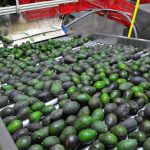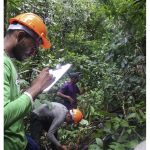
Criminal gangs are increasingly infiltrating legitimate business sectors such as trade, and importing more illegal products into the Netherlands, police research bureau Politie & Wetenschap has warned in its latest report.
The researchers found that the trade in avocados, plastic waste and timber are particularly prone to criminal infiltration and gangs earn money by circumventing local and international rules and regulations.
Parts of the avocado trade in Mexico, Peru, Colombia and Chile are also being taken over by gangs, the report said. Extortion, theft from local avocado farmers, and illegal slash and burn practices to obtain more land to grow avocados are rife.
When Russia invaded Ukraine in February 2022, sanctions swiftly followed, including a total ban on Russian timber imports into the European Union (EU) from July 2022. Belgium, one of the staunched supports of the EU ban, has become a profitable destination for Russian wood. Using a forensic laboratory at the Royal Museum for Central Africa in Tervuren, inspectors determined that several wood shipments from Russia had arrived in Belgium. The number of fines imposed for illegal harvests almost tripled in 2023.
“But an impediment is a distinct lack of inspectors,” Wynant said. “There are now fewer than five timber inspectors working full-time in Belgium, but there are 4500 timber importers,”according to the article .
The Development Bank of Latin America and the Caribbean (CAF) has announced an investment of US$25 million in Timberland Investment Group’s (TIG) reforestation strategy in Latin America. TIG, a subsidiary of BTG Pactual, aims to protect and restore around 150,000 hectares of deforested natural forests in Brazil, Uruguay and Chile. The initiative also aims to create sustainable and independently certified commercial forests to improve biodiversity and support inclusive community development. In line with its mission to boost sustainable development, CAF aims to become the region’s green bank committing to allocate US$25 billion in green financing by 2026 representing an increase from 24% to 40% of total approvals.
The revelations mirror Deforestation Inc. findings from around the world, which showed how auditing firms hired as environmental verifiers often ignore or fail to identify serious transgressions by their clients.
Audit firms in Finland, Indonesia, Chile, India, and Germany are also mentioned.
According to the World Bank, illegal logging in Chile’s native forests destroyed 11,368 hectares of land between 2013 and 2019 and generated 1.2 million m3 of illegally harvested timber – causing deforestation, loss of biodiversity, environmental degradation, and increasing violence. The southern regions of the country, such as La Araucanía and Biobío, are among those most affected by illegal logging activities. In May 2022, the government declared a state of emergency in the region of La Araucanía and in the provinces of Arauco and Biobío within the Biobío region.
This article will address illicit activities in Chile’s timber sector and identify associated financial risks. Ultimately, the article will discuss the current regulatory measures to combat illicit financial flows (IFF) stemming from environmental crimes.
Some 60 percent of the world’s lithium reserves can be found in the so-called lithium triangle, a region that encompasses Chile, Argentina, and Bolivia. It’s not just lithium either: Peru and Chile are the world’s two largest copper producers, while Brazil is home to 17 percent of all nickel reserves.
That has sparked a global scramble to tap the region’s wealth—one in which Chinese companies have an edge. Beyond lithium, Beijing has also struck deals for solar, wind, and hydroelectric projects across the region, pouring hundreds of millions of dollars into solar parks in Argentina and Brazil as well as signing contracts for hydroelectric projects in Bolivia and Argentina.
Part of the allure of partnering with Beijing, experts say, is the very nature of Chinese deals. China has boasted about its no-strings-attached financing, with fewer economic and political conditions than Western lenders. “[Governments] know that they’re not going to get the same level of quality by partnering with Chinese companies, but they also will get fewer headaches, fewer regulations, fewer lessons on the environment, fewer complaints from [nongovernmental organizations],” Berg said.
Click here to access the Global Illegal Logging and Associated Trade (ILAT) Risk assessment tool and to download the Forest Trends User Guide describing the functionality of the ILAT Risk Data Tool.
Click here to access the Cattle Data Tool.






